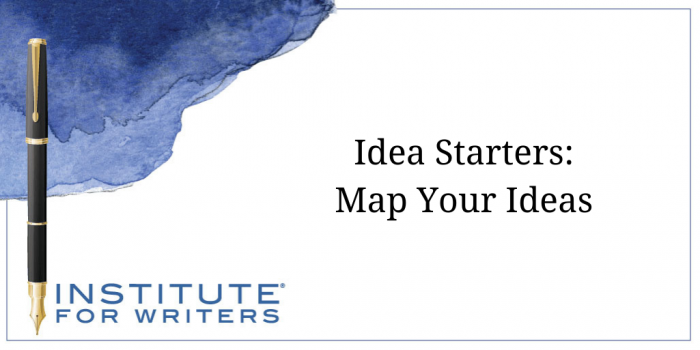1000 N. West Street #1200, Wilmington, DE 19801
© 2024 Direct Learning Systems, Inc. All rights reserved.

We teach our students how to write and get published!
View our Course Catalog >
An offshoot of mining for stories is mapping ideas. For me, it started as a way to think about and control how much money I make on my stories. Those of us who write for publication have all had the experience of being sold short. My philosophy is that an editor may tell you how much they can pay you, but you determine how much you make. Think about how much work you have to do a 600-800-word story. And now think about how much you have to cut out to get to that shorter story. Why not review what’s left on the “cutting room floor” as an idea starter? It’s working smarter not harder.
Look for idea starters in your existing nonfiction and fiction writing. When you map your ideas, there are always offshoots you can sell to other publications. There are ten ways to do any story. You get to use the grid to think of how to take a subject and think outside of the box you created for it. This is high-level brainstorming and idea starting. It is the thing we never do but can yield big results by doing it. What happens if you come up with ideas and think of the kinds of stories you want to do, say, if it’s nonfiction? You can do this at any point in your work, but I like to do it on the front end. That way I can save myself some time in my interviews. Instead of doing one interview and then having to come back months or weeks later, I can ask a few more questions that bubbled up from creating my mindmap, or ask my expert about other resources.
You can do it with your backlog of stories and ideas, too. Do you have pitches that you can’t seem to sell? Map them up. Do you have older sold stories that are just sitting in your clip file? Don’t just try to resell them. Brainstorm some ideas for the side stories or follow-ups. Go back and look at your notes to see what ideas you can mine. There are no bad ideas. There may be ideas you don’t want to take all the way to the pitch stage, but during the brainstorming stage, let the them roll like rain. Your ideas are a gold mine.
As an example, last month I mapped out some stories out of one core idea. I timed it. It took me 15 minutes. And I am happy to say that they were different enough that I sold four stories out of that 15-minute investment. The goal is to get a bunch of ideas in my back pocket and a list of reporting that I would need to do to have this ready to go if I get a yes. Do I want to do all these—NO. But I might want to do some of them later.
And here is the thing, I have story ideas for novels and nonfiction that I can pick from in the future. We sometimes run dry. Go to your maps. But do the researching while you have the experts on the phone already. It makes sense to have your resources in hand—working smarter not harder. It takes nothing to add two or three extra questions to any interview. But that’s why it is so smart to plan out how you are going to execute your ideas.
Here is a mental image to think about this idea starter. Think about a little black dress, or any black outfit. Ok? Now picture it hanging on your bedroom door. (The black outfit is the metaphor for your story). The process is taking that dress and adding pearls (one story idea). Add a fabulous scarf (another story idea). Your favorite sweater tied around your neck or wearing it with your outfit (another story idea). Gold accessories, (you guessed—another story). The key is to play freely with your idea starters and see what they become.
Put Pen to Paper
You could map things out in your head. But if you are a visual writer, paint yourself a little picture. By just taking a pen or pencil and a piece of paper and mapping out your ideas is a great way to really see what is possible. I often use a blank table that I have to write in ideas for new stories. You could do this on the computer, of course, but going old school can put you in the state you need to be in to “see” the stories and get out of your head.
Andrea King Collier is an award-winning journalist and author. She writes for leading print, online and broadcast outlets. She is the author of The Black Woman’s Guide to Black Men’s Health, and Still With Me… A Daughter’s Journey of Love and Loss. She is also an in-demand writing teacher and coach.
1000 N. West Street #1200, Wilmington, DE 19801
© 2024 Direct Learning Systems, Inc. All rights reserved.
1000 N. West Street #1200, Wilmington, DE 19801
© 2024 Direct Learning Systems, Inc. All rights reserved.
1000 N. West Street #1200, Wilmington, DE 19801
© 2024 Direct Learning Systems, Inc. All rights reserved.
1000 N. West Street #1200, Wilmington, DE 19801
© 2025 Direct Learning Systems, Inc. All rights reserved.
1000 N. West Street #1200, Wilmington, DE 19801
©2025 Direct Learning Systems, Inc. All rights reserved. Privacy Policy.
3 Comments